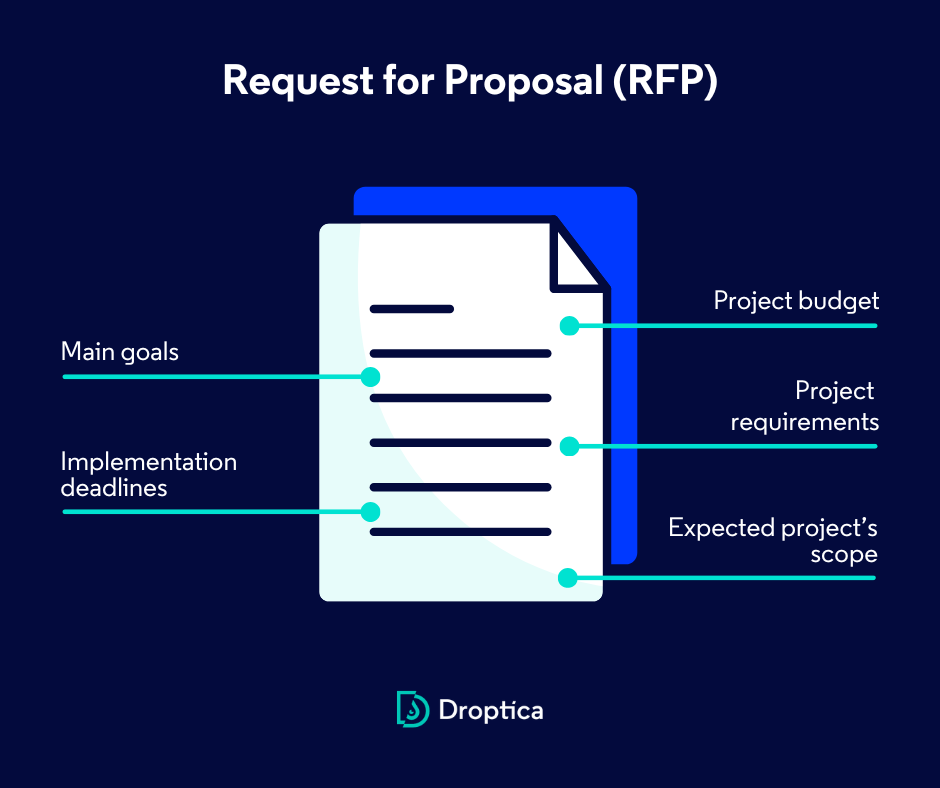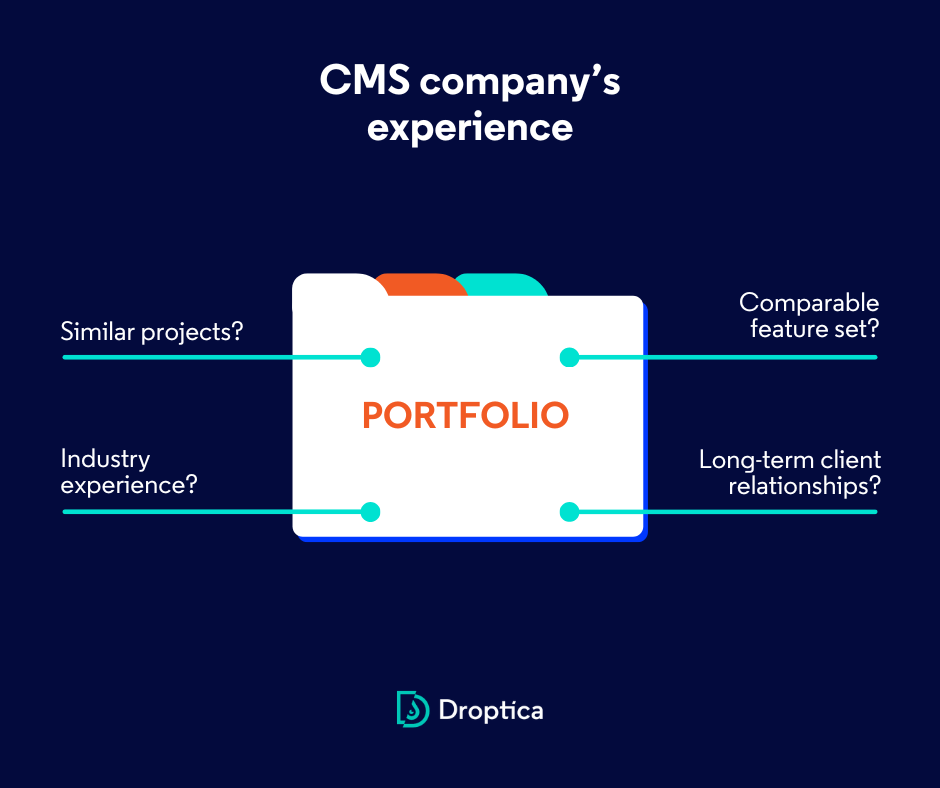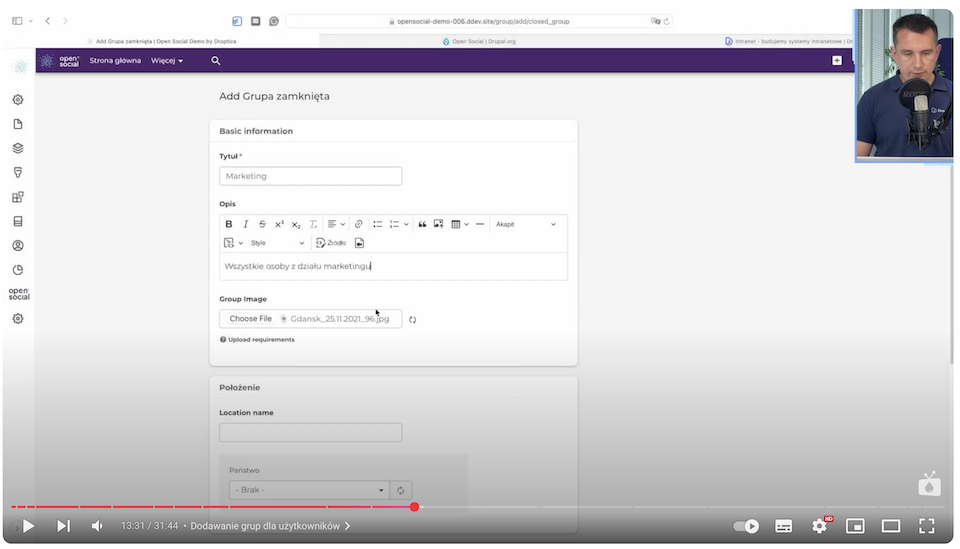
Comparing Proposals of CMS Companies - What to Consider?
In a previous blog post, we showed how to build a practical list of requirements for a system vendor. Now, we'll focus on comparing proposals from different CMS companies to avoid unforeseen costs, delays, and disappointments. In this article, we’ll provide key tips to help you make the best choice of a partner to work with to create a suitable CMS platform.
In this article:
- Why is choosing the right CMS company so important?
- How to prepare to analyze bids from CMS implementation companies?
- Key aspects of CMS implementation companies' bids
- How to evaluate the quality of communication and cooperation with a CMS company?
- Examples of best practices in selecting a CMS company
- Why is Droptica a good choice for CMS projects?
Why is choosing the right CMS company so important?
Implementing a new content management platform is usually a complex project that involves many departments and people in an organization. The choice of the CMS company translates directly into the implementation time, budget, and quality of the final solution.
A competent vendor will not only ensure that key functionality is properly implemented, but will also help minimize the risk of costly fixes and delays. An inexperienced partner, on the other hand, can turn a project into a string of problems and disappointments - even if it initially seemed attractively priced.
One of the most common examples of a wrong decision is when the implementation company doesn’t know the specifics of the industry or doesn’t have the right team. Lack of qualified specialists in the chosen technology or understanding of business processes often leads to unforeseen changes in the project.
Another typical problem is inconsistent communication, which creates confusion in the subsequent stages of implementation. When unclear arrangements and a lack of clear documentation come to light after several months of work, it can be too late to avoid having to rebuild some of the solutions.
Read also: How to choose a content management system (CMS)?
How to prepare to analyze bids from CMS implementation companies?
All of the above situations show how important it is to meticulously compare offers and choose a trusted partner who will reliably identify your needs and then professionally carry out the implementation. See how to prepare for a CMS company analysis.
Using a list of project requirements
The first step leading to a fair evaluation of proposals is to prepare a thorough list of requirements for the CMS vendor - both business and technological. Once you have a compiled set of needed functionality, security standards, or formal requirements, you can turn it into a Request for Proposal (RFP) that you’ll send to potential contractors.
In this document, you’ll specify the project's main goals, requirements, and expected scope of work, as well as the implementation deadlines and budget (which we write about later). This will allow potential contractors to understand your needs better and prepare bids tailored to the assumptions presented.

The more accurately you describe all aspects and expectations, the easier it will be later to compare individual proposals - in terms of functionality offered, costs, or cooperation. Thanks to the unified query format, you are sure that each supplier will evaluate the same guidelines, which will definitely make it easier to select the best partner for your CMS project.
Prioritizing the project
The next step is determining the order of activities and tasks in the project, which affects the smooth implementation and ultimate customer satisfaction. In a previous article about the list of requirements, we showed how to distinguish between "must-have" and "nice-to-have" elements. Such a division allows you to accurately define which main features must be included in the project's initial phase and which can wait until later.
In practice, this means that both the team and the future platform user need to know clearly what is an absolute priority regarding business goals. Establishing these priorities will make it easier to manage your budget and schedule. You’ll be able to compare bids from different CMS companies more effectively and determine what you intend to accomplish first, as well as what tasks can be deferred until the need arises or additional resources are available.
Determining a budget and schedule
Before asking potential contractors for a quote, try to define a realistic financial and deadline scope for the project. It’s best to base it on the company's past experience or interviews with other departments that will use the platform. The budget should take into account the cost of the implementation, subsequent maintenance, technical support, and possible expansions.
In turn, the schedule must consider not only the development time but also testing periods, employee training, and CMS integration with external systems. When talking to the supplier, ask what the proposed project milestones are and how the progress of the work will be accounted for. This will give you a clear picture of how the company plans to complete the task and whether it can fit within your timeframe.
Key aspects of CMS implementation companies' bids
The bid price shouldn’t be the only criterion for evaluating a potential supplier. Many studies show that over 50% of IT projects are delayed or over budget, and more than 30% are canceled altogether. These statistics also broadly apply to Drupal and other CMS implementations. This means that a cheap proposal can ultimately prove costly in its consequences if prepared by a company without the right experience or team. Below, you’ll find the most important aspects to look out for when comparing offerings from CMS implementation companies.
CMS company's experience and portfolio
Before you decide to cooperate, carefully analyze a given company's previous implementations. Check whether its portfolio includes projects similar to yours - preferably in the same or similar industry, with a comparable range of functionality and scale of the project.
It’s also crucial to pay attention to the length of cooperation with individual clients. Long-term relationships suggest customer satisfaction with services and indicate solid support after system implementation.

Transparency of pricing and scope of services
A precise and transparent estimation helps reduce costs at later stages of the project. Pay attention to whether the bid clearly defines the scope of work, the key phases of implementation, and the billing method. It’s a good signal to provide detailed specifications of individual tasks, test plans, or integration with third-party systems. The more information you include in the document, the easier it will be to predict whether the project will fit within your budget and deadlines.
Technical competence of the team
In the case of Drupal or other CMS technology implementations, it’s worth checking whether the company has specialists with the appropriate certifications and experience in working with a particular version of the platform. Business analysis, project management, and testing skills are also critical. This will give you confidence that the team will be able to effectively identify and address your technology needs and respond quickly to changing market or organizational requirements.
Support and maintenance of the system after implementation
Implementing a new CMS doesn’t end when it goes live on a production server. Continued technical support and expansion of the solution as your business grows are key. Therefore, ensure the vendor you choose offers maintenance services, security updates, and quick response to service requests. A reliable partner will ensure that your deployed system will function stably and allow you to focus on growing your business instead of constantly dealing with technical problems.
How to evaluate the quality of communication and cooperation with a CMS company?
One of the most underestimated yet key success factors on a project is good communication between the client and the CMS implementation company. Even the best development team may not live up to expectations if the flow of information is disrupted or unclear. That's why, before you sign a contract, it's worth looking closely at how a potential partner manages projects and communicates with clients at various stages of cooperation.
Project management processes
First, ask about the way of working that the team intends to use during implementation. More and more companies are adopting an agile approach (project management methodologies such as Agile or Scrum), which translates into flexibility in responding to changing requirements and systematic delivery of further functionality. Pay attention to whether the implementation team practices regular status meetings, holds short sprints, and presents progress through frequent reviews.
Good work organization also means having clear agreements on the responsibilities of individual team members. Before you start working together, find out who your main point of contact will be (whether it will be the project manager), how progress will be reported, and how the company plans to resolve any delays or schedule conflicts. Transparent project management processes increase the chances of delivering the platform on time, within budget, and according to the agreed scope.
Test stage of cooperation
It can be a good idea to start the cooperation on a smaller scale, for example, with a short audit, a discovery workshop, or executing a proof of concept (PoC). Such a test phase enables both parties to see if communication is going well and if the vision of the target system is consistent. In this way, you can assess how quickly the team responds to your questions, whether the information communicated is transparent, and how the company handles any changes in requirements.
If cooperation goes smoothly at this initial stage, you have a good chance of success for the entire implementation. On the other hand, any warning signs (e.g., long pauses in communication, unclear answers, lack of commitment) are worth considering in the final selection of a partner. A well-conducted test stage of cooperation can help avoid later disappointments and allow you to choose a team that best understands your needs.
Examples of best practices in selecting a CMS company
Before deciding on a partnership, it's a good idea to learn about proven methods that will help you assess the credibility and competence of potential partners.
Analysis of case studies and references
A proven way to verify a potential vendor's competence is to look at past projects. Well-crafted case studies of CMS implementations can reveal how the team solves specific challenges, manages communication, and adapts to the client's needs. Descriptions that include information about the initial situation, the course of the implementation, and the results achieved are particularly valuable.
In addition to project examples, ask for references or the opportunity to speak with the company's former or current clients. Such direct feedback often verifies claimed skills in terms of timeliness, transparency of operations, and level of commitment. This will give you confidence that the partner has practical experience in similar challenges.
Request for demo or prototype
Even before full cooperation, consider asking the implementation company to provide a demo or a prototype of the planned solution. This can be a simplified version of the system or even a visualization of key features. Such a presentation gives you a chance to:
- Early verification of ideas - you see how specific modules or integrations work out in practice.
- Assess the quality of the team's work - you can see whether the team can respond quickly to comments and whether the proposed changes are consistent with your assumptions.
- Communication test - while working on the prototype, you’ll naturally check how the cooperation goes and how the supplier approaches solving possible problems.
At Droptica, we often implement such demos for customers to help them understand the potential of Drupal and other solutions. For example, you can test the Droopler site builder performance of or an intranet system based on Open Social, which enables you to practically sample the most important functionalities and more easily imagine the target product. We also show some examples on the educational YouTube channel “Nowoczesny Drupal” in Polish.

Grzegorz Bartman, co-CEO at Droptica, presents an intranet demo on YouTube
A well-prepared prototype minimizes the risk of costly revisions in later stages and allows both parties to make sure that the vision of the target system is precise and feasible.
Why is Droptica a good choice for CMS projects?
When considering a contractor choice, it’s worth looking at companies that offer comprehensive support and have a proven track record in similar projects. Droptica is just such a partner - below, we explain why our approach to projects achieves high quality and safety.
International experience
The choice of a reliable CMS platform implementation company should be based on, among other things, an evaluation of past projects and its approach to security. Droptica is a team of about fifty specialists. Together, we’ve completed many implementations in Poland and abroad, including in the United States, the United Kingdom, Germany, and the Netherlands. This extensive experience has allowed us to develop effective methods of communication in different time zones, as well as proven processes that minimize the risk of delays and errors.
ISO27001 certification
As an added benefit, the company is ISO27001 certified, which demonstrates a structured approach to information security management. For clients, this means that project data and documentation are processed according to clearly defined procedures and remain adequately protected. Security can often be a key criterion when selecting a contractor - even more so if the project involves the processing of sensitive information or requires compliance with industry regulations.
A comprehensive approach to building CMS platforms
In the article, we pointed out that the price of a project alone shouldn’t be the only factor in choosing a contractor. Equally important is support at every stage of implementation and consistency throughout the process. At Droptica, we emphasize thorough needs analysis, solution planning, UI/UX design, and professional development and testing. All this is done in close cooperation with the client, with clear communication and regular presentations of the work results.
Comparing proposals of CMS companies - summary
Selecting a CMS company is a multi-step process that requires careful analysis - not only in terms of price but also experience, quality of communication, technical competence, and the level of post-implementation support. The tips presented in the article show how to use a well-prepared list of requirements, set priorities, verify the credibility of the supplier, and assess the prospects for long-term cooperation.
All these elements combined will allow you to minimize the risk of surprises during implementation and create a platform that genuinely responds to your organization's needs. If you’re looking for an experienced CMS solution development partner, we invite you to take a look at our offer.











